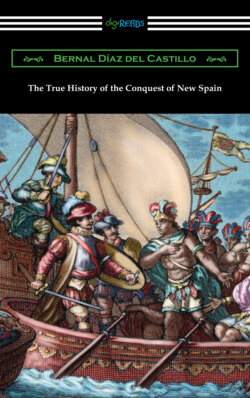Читать книгу The True History of the Conquest of New Spain - Bernal Diaz del Castillo - Страница 82
На сайте Литреса книга снята с продажи.
CHAPTER LXXVI.
ОглавлениеHow mass was said in the presence of a great number of caziques, and of the present the latter brought us.
The next morning early Cortes ordered an altar to be constructed, and mass to be said, as we now again had a supply of wine and holy wafers. Father Olmedo lying ill of the fever, which had greatly weakened him, the priest Juan Diaz officiated for him: Maxixcatzin, the elder Xicotencatl, and several other caziques were present.
After mass, Cortes retired to his quarters. Those among us who were always about his person accompanied him: we were also followed by the old caziques and our interpreters, who were indispensable in such company. The elder Xicotencatl now informed Cortes that it was the general wish of the inhabitants to make him a present, if agreeable to him. Cortes answered that he should at all times be most happy to receive one: they accordingly spread some mats on the floor, and over these a few cloaks, upon which they arranged five or six small pieces of gold, a few stones of trifling value, and several parcels of manufactured nequen, altogether a very poor present, and not worth twenty pesos. The caziques, on presenting these things to Cortes, said to him, with a smile on their countenance, “Malinche! we can easily imagine that you will not exactly experience much joy on receiving a present of such wretched things as these; but we have told you before that we are poor, possessing neither gold nor other riches, as the deceitful Mexicans, with their present monarch Motecusuma, have by degrees despoiled us of everything we had. Do not look to the small value of these things, but accept them in all kindness, and as coming from your faithful friends and servants.” These presents were at the same time accompanied by a quantity of provisions.
Cortes accepted of all this with every appearance of delight, and assured the old men that, since these things came from them, and were given with such great good will, they had more value in his estimation than a whole house full of gold, and that he accepted of them in that light. These words he accompanied with numerous other kind sayings and assurances of the esteem he entertained for them.
The caziques had also agreed among themselves to present us the most beautiful of their daughters and nieces. The old Xicotencatl, therefore, again addressed Cortes: “In order, Malinche, that you may have a still clearer proof of our good feeling towards you, and to show you how glad we are to do anything which we imagine may please you, we have resolved to give you our daughters in marriage, that they may have children by you. We should like to be completely fraternized with such good and brave men as you are. I myself have a daughter, who is very beautiful, and has never been married, whom I have destined for you.”
Maxixcatzin and most of the other caziques continued in the same strain, begging of us to take their daughters for our wives. These requests were accompanied by various other proffers of friendship, and Maxixcatzin and Xicotencatl passed the whole day with us: the latter was blind with age; in order, therefore, to form to himself some idea of Cortes, he drew his hand over his hair, his face, his beard, and the whole of his body.
Cortes answered, with respect to the women, that he himself and all of us were very grateful for them, and that we should take the first opportunity of rendering them a kindness in return.
“What is your opinion,” said Cortes, turning to father Olmedo, “would this not be the proper moment to desire these people to abolish their idols and the human sacrifices? From fear of the Mexicans, they will undoubtedly do anything we require of them.” “It will be time enough,” answered the priest, “when they bring us their daughters: then we shall have the best opportunity of telling them that we cannot accept of them until they have promised to abstain from their human sacrifices. If they comply, it is well; if they refuse, we know what our duty and our religion require of us.”
